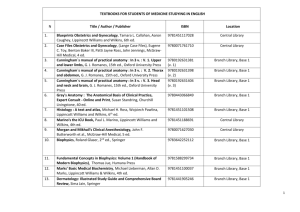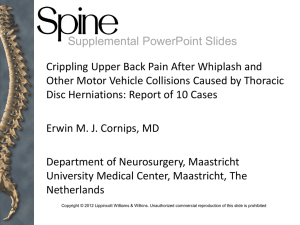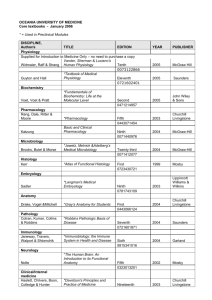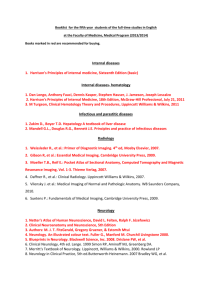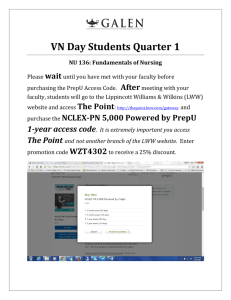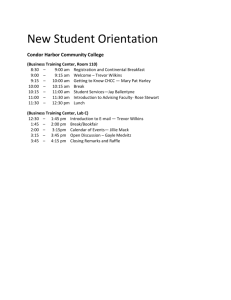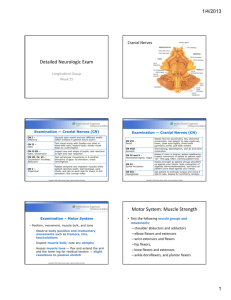Immunologic Drugs
advertisement
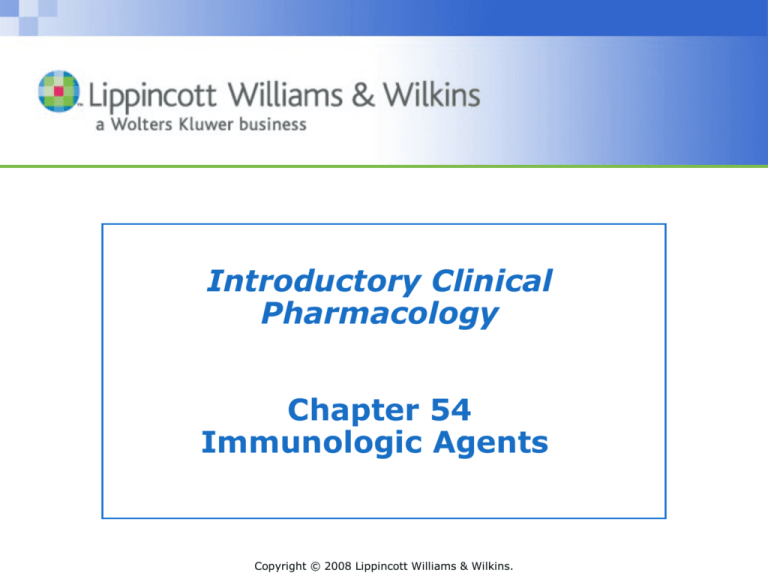
Introductory Clinical Pharmacology Chapter 54 Immunologic Agents Copyright © 2008 Lippincott Williams & Wilkins. Immunity • The ability of the body to identify and resist potentially harmful microorganisms • Cell mediated – T lymphocytes – Delayed immune response – Viral, fungal, some bacterial • Humeral immunity – B lymphocytes – Antigen-antibody response Copyright © 2008 Lippincott Williams & Wilkins. Cell-mediated Immunity • Results from activity of leukocyte actions, reactions, interactions that range from simple to complex • Depend on actions of T lymphocytes, which are responsible for delayed type of immune response • CMI reduced in acquired immunodeficiency syndrome (AIDS): Body is unable to protect against viral, bacterial, fungal infections Copyright © 2008 Lippincott Williams & Wilkins. Humoral Immunity • In humoral immunity: – B lymphocytes: Produce circulating antibodies to act against foreign substance • Based on antigen-antibody response • Antigen: Protein that stimulates the body to produce antibodies • Antibody: Globulin produced by B lymphocytes as defense against an antigen Copyright © 2008 Lippincott Williams & Wilkins. Active and Passive Immunity: Active Immunity • Two types of active immunity – Naturally acquired active immunity – Artificially acquired active immunity • Naturally acquired active immunity – Occurs when person is exposed to disease or experiences disease; body manufactures antibodies to provide future immunity to the disease Copyright © 2008 Lippincott Williams & Wilkins. Active and Passive Immunity: Active Immunity (cont’d) • Artificially acquired active immunity – Occurs: Individual is given killed or weakened antigen to stimulate formation of antibodies against the antigen – Requires periodic booster injections to keep adequate antibody level circulating in blood – Booster injection: Additional dose of vaccine to boost production of antibodies to level that maintains desired immunity Copyright © 2008 Lippincott Williams & Wilkins. Active and Passive Immunity: Passive Immunity • Obtained from administration of immune globulins or antivenins • Provide individual with ready-made antibodies from another human or an animal • Provides immediate immunity to invading antigen – Lasts for only a short time Copyright © 2008 Lippincott Williams & Wilkins. Immunologic Agents • Capitalize on body’s natural defenses: Stimulate immune response and create within body protection to specific disease • Supply ready-made antibodies to provide passive immunity Copyright © 2008 Lippincott Williams & Wilkins. Immunologic Agents: Actions and Uses • Vaccines and toxins: – Vaccines: Contain either attenuated (weakened) or killed antigen, developed to create immunity to certain diseases – Toxins: Poisonous substance produced by some bacteria that cause tetanus •Capable of stimulating body to produce antitoxins Copyright © 2008 Lippincott Williams & Wilkins. Immunization Preventable Diseases • Anthrax • Rotavirus • Chickenpox • Hib • Diphtheria • HPV • Hepatitis A • Influenza • Hepatitis B • Measles • Pertussis • Pneumococcal • Polio • Rabies • Rubella • Meningococcus • Mumps • Tetanus • Smallpox Copyright © 2008 Lippincott Williams & Wilkins. Immunologic Agents: Actions and Uses (cont’d) • Vaccines and toxoids are used for: – Routine immunization of infants and children – Immunization of adults against tetanus – Adults at high risk for certain diseases – Children or adults at risk for exposure to a particular disease – Immunization of prepubertal girls or nonpregnant women of childbearing age against rubella Copyright © 2008 Lippincott Williams & Wilkins. Immunologic Agents: Actions and Uses (cont’d) • Immune globulins and antivenins – Immune globulins: Solutions obtained from human or animal blood containing antibodies formed by body to specific antigens – Antivenins: Used for passive, transient protection from toxic effects of bites by spiders and snakes Copyright © 2008 Lippincott Williams & Wilkins. Immunologic Agents: Adverse Reactions • Vaccines and toxoids – Chills; fever – Muscular aches and pains; rash; lethargy – Pain and tenderness at the injection site – Hypersensitivity reaction Copyright © 2008 Lippincott Williams & Wilkins. Immunologic Agents: Adverse Reactions (cont’d) • Immune globulins and antivenins – Immune globulins • Urticaria; angioedema; erythema, malaise; nausea; diarrhea – Antivenins • Hypersensitivity; apprehension; flushing; itching • Urticaria; edema of the face, tongue, and throat; dyspnea; cyanosis Copyright © 2008 Lippincott Williams & Wilkins. Immunologic Agents: Contraindications and Precautions • Vaccines and toxoids – Contraindicated in patients •With acute febrile illnesses, leukemia, lymphoma, immunosuppressive illness or drug therapy, nonlocalized cancer – Immunologic agents •Used with extreme caution in individuals with a history of allergies Copyright © 2008 Lippincott Williams & Wilkins. Immunologic Agents: Contraindications and Precautions (cont’d) • Immune globulins contraindicated in patients with: –History of allergic reactions after administration of human immunoglobulin preparations –Isolated immunoglobulin A deficiency • Antivenins contraindicated in patients with hypersensitivity to horse serum or any other component of serum Copyright © 2008 Lippincott Williams & Wilkins. Immunologic Agents: Interactions • Vaccines and toxoids – Corticosteroids; antineoplastic drugs; radiation therapy; depress immune system – Salicylates administered with varicella vaccination: Risk for Reye’s syndrome Copyright © 2008 Lippincott Williams & Wilkins. Immunologic Agents: Interactions (cont’d) • Immune globulins and antivenins – Antibodies in immune globulin preparations •Interfere with immune response to live virus vaccines, particularly measles as well as others (mumps and rubella) Copyright © 2008 Lippincott Williams & Wilkins. Nursing Process: Assessment • Preadministration assessment – Obtain allergy history before administration of any vaccine – Tell primary health care provider before vaccine is given if individual is known to have allergies of any kind – Determine whether patient has any conditions that contraindicate administration of agent Copyright © 2008 Lippincott Williams & Wilkins. Nursing Process: Assessment (cont’d) • Ongoing assessment – Ask patient to stay in clinic or office for observation after injection to observe for signs of hypersensitivity – Keep emergency resuscitation equipment available to use in event of severe hypersensitivity reaction Copyright © 2008 Lippincott Williams & Wilkins. Nursing Process: Planning • Expected outcome – Optimal response to immunologic agent – Support of patient needs related to the management of common adverse drug effects – Understanding of and compliance with prescribed immunization schedule Copyright © 2008 Lippincott Williams & Wilkins. Nursing Process: Implementation • Promoting an optimal response to therapy – Read directions enclosed with vaccine – Document following information in patient’s chart or form •Date of vaccination; route and site, vaccine type, manufacturer •Lot number and expiration date •Name, address, title of individual administering vaccine Copyright © 2008 Lippincott Williams & Wilkins. Nursing Process: Implementation • Monitoring and managing patient needs – Pain: Acute •Increase fluids in diet, allow for adequate rest •Keep atmosphere quiet and nonstimulating •Treat local irritation at injection site with warm or cool compresses, depending on patient’s preference Copyright © 2008 Lippincott Williams & Wilkins. Nursing Process: Implementation • Monitoring and managing patient needs (cont’d): – Individual effective therapeutic regimen management •Encourage parents to have their infants and young children receive immunizations •Provide parent with copy of the record of immunizations Copyright © 2008 Lippincott Williams & Wilkins. Nursing Process: Implementation • Educating the patient and family – Discuss risks of contracting vaccinepreventable diseases, benefits of immunization – Instruct parents to bring immunization records to all visits – Provide date for return for next vaccination – Discuss adverse reactions, methods to combat these reactions Copyright © 2008 Lippincott Williams & Wilkins. Nursing Process: Evaluation • Therapeutic effect is achieved • Disease does not present itself • Adverse drug reactions managed successfully • Patient or parent/guardian comply with the immunization schedule • Patient and family express understanding of need for immunizations Copyright © 2008 Lippincott Williams & Wilkins.
